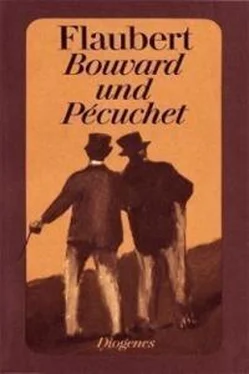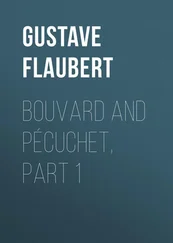They were rudely shaken by a letter from Tardivel. The other son, M. Alexandre, declared his intention to have the entire matter decided by law, and even to question the legacy, if he could, requiring, first of all, to have everything sealed, and to have an inventory taken and a sequestrator appointed, etc. Bouvard got a bilious attack in consequence. Scarcely had he recovered when he started for Savigny, from which place he returned without having brought the matter nearer to a settlement, and he could only grumble about having gone to the expense of a journey for nothing. Then followed sleepless nights, alternations of rage and hope, of exaltation and despondency. Finally, after the lapse of six months, his lordship Alexandre was appeased, and Bouvard entered into possession of his inheritance.
His first exclamation was: "We will retire into the country!" And this phrase, which bound up his friend with his good fortune, Pécuchet had found quite natural. For the union of these two men was absolute and profound. But, as he did not wish to live at Bouvard's expense, he would not go before he got his retiring pension. Two years more; no matter! He remained inflexible, and the thing was decided.
In order to know where to settle down, they passed in review all the provinces. The north was fertile, but too cold; the south delightful, so far as the climate was concerned, but inconvenient because of the mosquitoes; and the middle portion of the country, in truth, had nothing about it to excite curiosity. Brittany would have suited them, were it not for the bigoted tendency of its inhabitants. As for the regions of the east, on account of the Germanic patois they could not dream of it. But there were other places. For instance, what about Forez, Bugey, and Rumois? The maps said nothing about them. Besides, whether their house happened to be in one place or in another, the important thing was to have one. Already they saw themselves in their shirt–sleeves, at the edge of a plat–band, pruning rose trees, and digging, dressing, settling the ground, growing tulips in pots. They would awaken at the singing of the lark to follow the plough; they would go with baskets to gather apples, would look on at butter–making, the thrashing of corn, sheep–shearing, bee–culture, and would feel delight in the lowing of cows and in the scent of new–mown hay. No more writing! No more heads of departments! No more even quarters' rent to pay! For they had a dwelling–house of their own! And they would eat the hens of their own poultry–yard, the vegetables of their own garden, and would dine without taking off their wooden shoes! "We'll do whatever we like! We'll let our beards grow!"
They would purchase horticultural implements, then a heap of things "that might perhaps be useful," such as a tool–chest (there was always need of one in a house), next, scales, a land–surveyor's chain, a bathing–tub in case they got ill, a thermometer, and even a barometer, "on the Gay–Lussac system," for physical experiences, if they took a fancy that way. It would not be a bad thing either (for a person cannot always be working out of doors), to have some good literary works; and they looked out for them, very embarrassed sometimes to know if such a book was really "a library book."
Bouvard settled the question. "Oh! we shall not want a library. Besides, I have my own."
They prepared their plans beforehand. Bouvard would bring his furniture, Pécuchet his big black table; they would turn the curtains to account; and, with a few kitchen utensils, this would be quite sufficient. They swore to keep silent about all this, but their faces spoke volumes. So their colleagues thought them funny. Bouvard, who wrote spread over his desk, with his elbows out, in order the better to round his letters, gave vent to a kind of whistle while half–closing his heavy eyelids with a waggish air. Pécuchet, squatted on a big straw foot–stool, was always carefully forming the pot–hooks of his large handwriting, but all the while swelling his nostrils and pressing his lips together, as if he were afraid of letting his secret slip.
After eighteen months of inquiries, they had discovered nothing. They made journeys in all the outskirts of Paris, both from Amiens to Evreux, and from Fontainebleau to Havre. They wanted a country place which would be a thorough country place, without exactly insisting on a picturesque site; but a limited horizon saddened them.
They fled from the vicinity of habitations, and only redoubled their solitude.
Sometimes they made up their minds; then, fearing they would repent later, they changed their opinion, the place having appeared unhealthy, or exposed to the sea–breeze, or too close to a factory, or difficult of access.
Barberou came to their rescue. He knew what their dream was, and one fine day he called on them to let them know that he had been told about an estate at Chavignolles, between Caen and Falaise. This comprised a farm of thirty–eight hectares, [1] Roughly speaking, about 93 acres.—TRANSLATOR.
with a kind of château, and a garden in a very productive state.
They proceeded to Calvados, and were quite enraptured. For the farm, together with the house (one would not be sold without the other), only a hundred and forty–three thousand francs were asked. Bouvard did not want to give more than a hundred and twenty thousand.
Pécuchet combated his obstinacy, begged of him to give way, and finally declared that he would make up the surplus himself. This was his entire fortune, coming from his mother's patrimony and his own savings. Never had he breathed a word, reserving this capital for a great occasion.
The entire amount was paid up about the end of 1840, six months before his retirement.
Bouvard was no longer a copying–clerk. At first he had continued his functions through distrust of the future; but he had resigned once he was certain of his inheritance. However, he willingly went back to MM. Descambos; and the night before his departure he stood drinks to all the clerks.
Pécuchet, on the contrary, was morose towards his colleagues, and went off, on the last day, roughly clapping the door behind him.
He had to look after the packing, to do a heap of commissions, then to make purchases, and to take leave of Dumouchel.
The professor proposed to him an epistolary interchange between them, of which he would make use to keep Pécuchet well up in literature; and, after fresh felicitations, wished him good health.
Barberou exhibited more sensibility in taking leave of Bouvard. He expressly gave up a domino–party, promised to go to see him "over there," ordered two aniseed cordials, and embraced him.
Bouvard, when he got home, inhaled over the balcony a deep breath of air, saying to himself, "At last!" The lights along the quays quivered in the water, the rolling of omnibuses in the distance gradually ceased. He recalled happy days spent in this great city, supper–parties at restaurants, evenings at the theatre, gossips with his portress, all his habitual associations; and he experienced a sinking of the heart, a sadness which he dared not acknowledge even to himself.
Pécuchet was walking in his room up to two o'clock in the morning. He would come back there no more: so much the better! And yet, in order to leave behind something of himself, he printed his name on the plaster over the chimney–piece.
The larger portion of the baggage was gone since the night before. The garden implements, the bedsteads, the mattresses, the tables, the chairs, a cooking apparatus, and three casks of Burgundy would go by the Seine, as far as Havre, and would be despatched thence to Caen, where Bouvard, who would wait for them, would have them brought on to Chavignolles.
But his father's portrait, the armchairs the liqueur–case, the old books, the time–piece, all the precious objects were put into a furniture waggon, which would proceed through Nonancourt, Verneuil, and Falaise. Pécuchet was to accompany it.
Читать дальше








![Гюстав Флобер - Закат Карфагена [Сборник]](/books/414440/gyustav-flober-zakat-karfagena-sbornik-thumb.webp)


